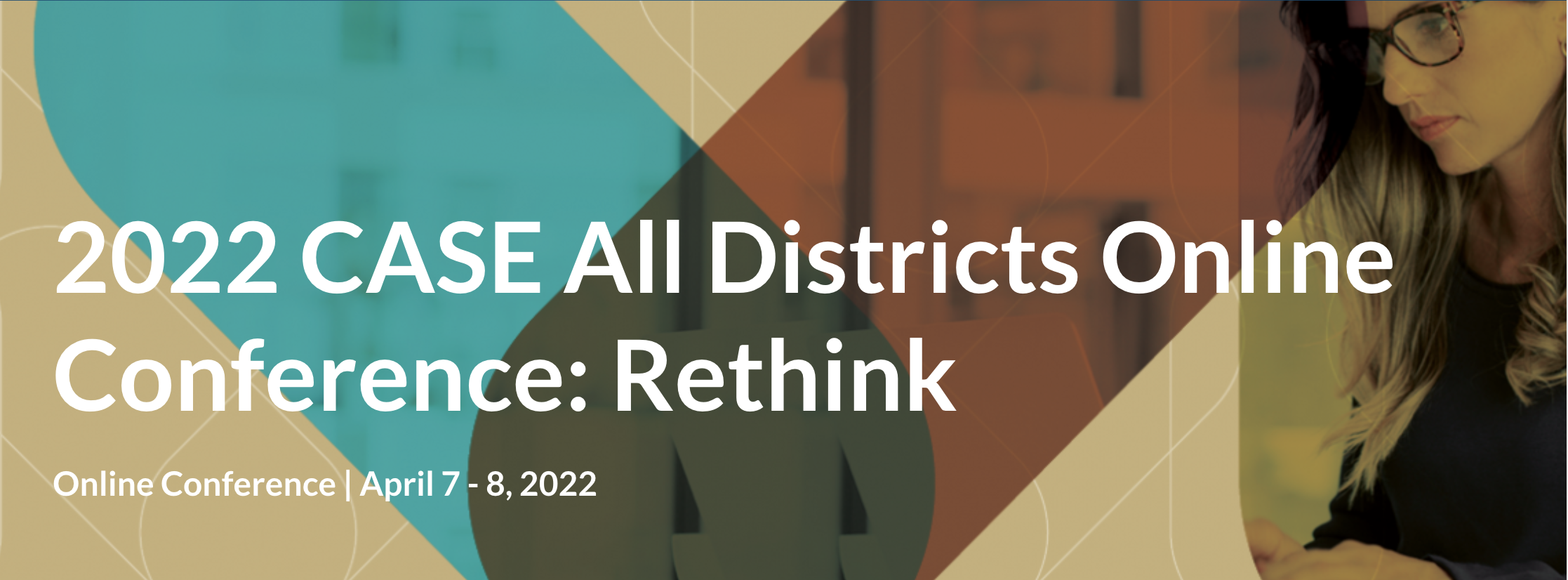
For the second year in a row, the Council for the Advancement and Support of Education went virtual for the CASE All Districts Online Conference, bringing together higher education and advancement professionals from across the country. Affinaquest was proud to be a Silver Sponsor of the event, which included two packed days of networking and presentations from leaders across the industry.
From that wealth of expertise, the Affinaquest team walked away with three big lessons from the conference:
- Moving Forward Requires Imagination (and Reimagination)
- The Future of Engagement is Digital—and Personal
- Data is the Great Disrupter—and Driver—of Modern Advancement
Keep reading to dig deeper into these ideas.
1. Moving Forward Requires Imagination (and Reimagination)
With “Rethink” selected as the overall theme for the conference, it’s no surprise that so many presentations focused on taking a new approach to advancement. This overarching idea spanned several secondary themes as well, such as diversity, equity, and inclusion.
- In Revisiting W. E. B. DuBois’ Talented Tenth Framework: Leveraging Black Philanthropic Behaviors, Craig L. Jackson (University of Nevada, Las Vegas) and Sam Alavi-Irvine (Samuel Merritt University) explained how fundraising with Black donors often looks different than traditional (and historically white-centered) fundraising, affecting everything from prospect identification to recognition. Because of this, engaging Black alumni and donors in the future of the university requires a thoughtful new approach, such as using society membership to find major gift prospects rather than traditional wealth indicators like real estate.
- Peter Hayashida (University of California, Riverside) described—and challenged—the standard process for engaging institutional volunteers and board members in a panel session called Impact Redefined: Leveraging Expertise to Advance DEI Philanthropy presented with Sara DuCuennois (FIU Alumni Association) and Penelepe Hunt (Marts&Lundy). Network-based recruitment has often led to homogeneous leadership groups that may not represent the diversity of the institution. UC Riverside redeveloped recruitment practices and expanded its networks to engage individuals that traditional methods would have overlooked.
- The evolution of annual giving—and whether that name still applies—was explored in the panel conversation What’s Next, Next? Rethinking What We Call ‘Annual Giving’ with Heather Kopec (University of Miami), Adam Compton (North Carolina State University), and Jake Strang (University of Pittsburgh). Annual giving is no longer a once annual event for donors; it’s a unique pathway to building donor habits, engaging in regular giving, and discovering philanthropic passions on campus. “My ideal donor has their traditional ‘annual gift’ set up as a recurring monthly gift, and they’re inspired throughout the year to make additional gifts,” Compton explained.
- At a breakfast roundtable session, Lori Stirling, Vice President of Implementation Services for Affinaquest, invited participants into a dynamic conversation about the typical timeline for CRM implementation. The conclusion? A better—and faster—implementation schedule is often possible with the right tools and vendors. To learn more about Advancement RM, Affinaquest’s CRM solution for higher ed advancement, schedule a demo with our team.
2. The Future of Engagement is Digital
With thoughtful segmentation and personalization made possible through digital strategies, a targeted, curated donor experience is no longer restricted to the realms of major giving. We saw this in several presentations at the CASE All Districts Online Conference.
- At Ashland University, a limited donor pipeline and an ambitious goal opened the door for an unconventional approach to campaign fundraising, using digital marketing strategies to build affinity and develop a prospect pipeline. As Margaret Pomfret (now at Ohio Dominican University) explained with Colleen Cook and Scott Williams (Vinyl Marketing) in the session No Silent Phase? Transforming The Traditional Model with Digital Marketing, the unexpected strategy worked; taking a digital marketing approach led to gifts that more than doubled the campaign goal—with time to spare.
- In Launching and Rethinking Leadership Annual Giving with Digital 1st Approach, Adam Compton and Josh Privette described how they built a leadership annual giving program at NC State, an Affinaquest Advancement RM client. After discovering that donors tend to stick with middle-level giving once they get there, they employed digital techniques to move donors through the pipeline more quickly, building and retaining a more consistent mid-level donor pool.
- Video is not just an option for powerful storytelling; it’s a necessity, said Mary Bourne (Kansas State University) in Reimagining Engagement Through Video. In early 2020, the K-State advancement team quickly developed a suite of fundraising videos to support a COVID-19 emergency fund. This successful pivot led to a thriving “digital ecosystem” that empowers the university to provide meaningful virtual experiences for alumni and donors worldwide.

3. Data is the Great Disrupter—and Driver—of Modern Advancement
While data has been growing in importance for a long time, it is now a cornerstone of higher education advancement.
Most—if not all—CASE All Districts Online Conference presenters cited data as the catalyst and informant for the strategies and successes they discussed. With titles including data analysis, marketing, fundraising, and more, they proved that data management and analysis are no longer relegated to a particular role or team.
“We all live for a good VLOOKUP.” joked Jake Strang from Pitt.
Never before has advancement had access to so much data, nor the tools to use that data effectively (not to mention a global pandemic to force innovation). At the click of a button, advancement teams can gather data from across campus—spirit gear and ticket purchases, event attendance, marketing responses—and display that data in radiant, insight-rich color.
Even more, digital tools make the rapid-fire collection of data possible. Surveys, for example, can be quickly developed, distributed, collected, and tallied for timely insights.
- In The Learner First Approach: A New Way To Define, Measure and Achieve Student & Alumni Success, Matt Kelly (PeopleGrove) described the “bias for action” that comes from survey results. He pinpoints career support as a critical and widespread need for alumni throughout their lives—and notes how meeting those needs keeps the institution relevant to alumni well past graduation.
- “Follow the data,” said Sarah Byrd (Northern Kentucky University) in a presentation with David Johnson (KU Alumni Association) and Mirko Widenhorn (Anthology) called Recent Alumni Engagement: Using Survey Data to Inform Your Strategies. The trio discussed how their institutions adjusted in response to surveys conducted in 2021, leading to better connections with recent alumni.
Stockpiles of comprehensive data are critical to the future of advancement work, but they’re meaningless if not analyzed and utilized. This is where a strong data culture comes into play.
- Data literacy—the ability to read, work with, analyze, access, and communicate with data—is a critical building block of data culture, according to Christopher Amherst (Rochester Institute of Technology) and Robyn Doughty (University of California, Berkeley) in Parlez-vous Data? The ABC’s of Data Culture and Impact on Data Strategy. Without data literacy, employees often procrastinate, create workarounds for, or even altogether avoid, data-related tasks.
With solid data literacy, however, advancement teams better understand the power of the data and how they can contribute to its success, leading to powerful outcomes.
- During the Q&A portion of Measuring Engagement: A Key Performance Indicator Approach with Samantha Frost, Danielle Huskey, and Molly Schmied (The Ohio State University), an attendee asked how the team could get data from across campus for their institutional engagement scores. The presenters put it this way: everybody wants their data reflected in the tool.
This is the goal and emerging reality for data-powered advancement: ongoing, enthusiastic collection of constituent data from across campus to drive strategic, collaborative engagement of our donors and alumni.
Thank You for Attending the 2022 CASE All Districts Online Conference!
Affinaquest is proud to be a frequent sponsor of CASE events. Thank you to everyone who joined us online, stopped by our virtual booth, or participated in our roundtable discussion.
Affinaquest was developed with the specific needs of advancement in mind. We want to help your institution reimagine the future of your advancement program with our core CRM, Advancement RM, and our full suite of data enrichment and matching gift tools. Schedule a demo with our team today!




